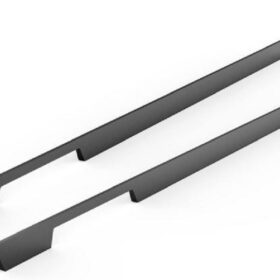Comparing Aluminum Alloy Handles to Other Materials
Comparing Aluminum Alloy Handles to Other Materials: Unlocking Robustness and Versatility
In the realm of engineering, the choice of materials plays a pivotal role in determining the durability, functionality, and overall performance of a product. When it comes to handles, aluminum alloys have emerged as a formidable contender, offering a compelling combination of strength, lightness, and adaptability.
Aluminum alloys are lightweight and strong, making them ideal for applications where weight reduction is paramount without compromising integrity. They are significantly lighter than steel or titanium, reducing overall weight and improving handling. This weight reduction is particularly advantageous in applications such as hand tools, sporting equipment, and medical devices.
Corrosion resistance is another key advantage of aluminum alloys. Unlike steel, which is prone to rust, aluminum forms a protective oxide layer that resists the effects of water, chemicals, and other corrosive agents. This makes aluminum alloys ideal for use in harsh environments, including marine applications, chemical processing facilities, and outdoor furniture.
The versatility of aluminum alloys is another notable trait. They can be easily machined, cast, forged, and welded, allowing for intricate designs and complex shapes. This versatility enables manufacturers to create custom handles that meet specific application requirements.
In applications requiring electrical conductivity, aluminum alloys excel. They are superior conductors of electricity compared to other materials, making them ideal for use in electrical handles, connectors, and enclosures. This property also enhances heat dissipation, preventing overheating in high-current applications.
However, it’s important to note that aluminum alloys are not without their limitations. They are typically softer than steel, making them more susceptible to scratches and dents. Additionally, they may exhibit creep at elevated temperatures. Therefore, it’s crucial to consider the specific application requirements when selecting an aluminum alloy handle.
In conclusion, aluminum alloy handles offer a compelling alternative to other materials due to their combination of strength, lightness, corrosion resistance, versatility, and electrical conductivity. Their unique properties make them well-suited for a wide range of applications, from hand tools to electrical enclosures. By carefully considering application requirements and limitations, engineers can leverage the advantages of aluminum alloys to create durable, lightweight, and functional handles that enhance overall product performance.
-
2024-11-29Top Trends in Modern Kitchen Cabinet Pulls for 2024
-
2024-11-28The Ultimate Guide to Modern Kitchen Cabinet Pulls- Materials, Styles, and Tips
-
2024-11-27Elevate Your Kitchen Design with These Must-Have Modern Cabinet Pulls
-
2024-11-26Sleek and Stylish- The Best Modern Kitchen Cabinet Pulls for a Contemporary Look










